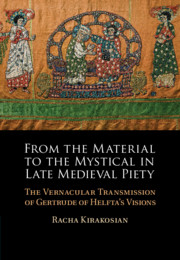 From the Material to the Mystical in Late Medieval Piety
From the Material to the Mystical in Late Medieval Piety Book contents
- From the Material to the Mystical in Late Medieval Piety
- From the Material to the Mystical in Late Medieval Piety
- Copyright page
- Dedication
- Contents
- Illustrations
- Acknowledgements
- Note on the Maps
- Introduction
- One The Helfta Scriptorium
- Two Redactions within a Dynamic Textuality
- Three Manuscript Transmission History
- Four The Book’s Self-Reflectivity
- Five The Scriptorial Heart
- Six Imaginary Textiles
- Final Remarks
- Book part
- Notes
- Bibliography
- Index
One - The Helfta Scriptorium
Published online by Cambridge University Press: 01 September 2021
- From the Material to the Mystical in Late Medieval Piety
- From the Material to the Mystical in Late Medieval Piety
- Copyright page
- Dedication
- Contents
- Illustrations
- Acknowledgements
- Note on the Maps
- Introduction
- One The Helfta Scriptorium
- Two Redactions within a Dynamic Textuality
- Three Manuscript Transmission History
- Four The Book’s Self-Reflectivity
- Five The Scriptorial Heart
- Six Imaginary Textiles
- Final Remarks
- Book part
- Notes
- Bibliography
- Index
Summary
This chapter addresses the late thirteenth- and early fourteenth-century writing culture at the convent of Helfta and its implications for the ideas about how divine matters are communicated that are contained in the resulting texts. The ‘Helfta phenomenon’ is marked by an intense period of written production towards the end of the thirteenth century, which led to the emergence of some of the most popular mystical texts in the Western tradition: The Flowing Light of the Godhead, the Liber specialis gratiae, and the Legatus divinae pietatis. Although no autographs of these texts have survived – unless they remain undiscovered – we can be certain that the mystical texts attributed to the Helfta nuns were composed in collective settings, mostly at the convent of Helfta itself. Discussions of collective authorship and gendered writing can lead to a new understanding of the crossover of textual transmission and the social practices of writing and reading, using the production of writings at Helfta and the text material related to Gertrude of Helfta’s life, in particular the Latin and German traditions, as examples for wider phenomena of scribal culture in the Middle Ages.
- Type
- Chapter
- Information
- From the Material to the Mystical in Late Medieval PietyThe Vernacular Transmission of Gertrude of Helfta's Visions, pp. 12 - 32Publisher: Cambridge University PressPrint publication year: 2021
